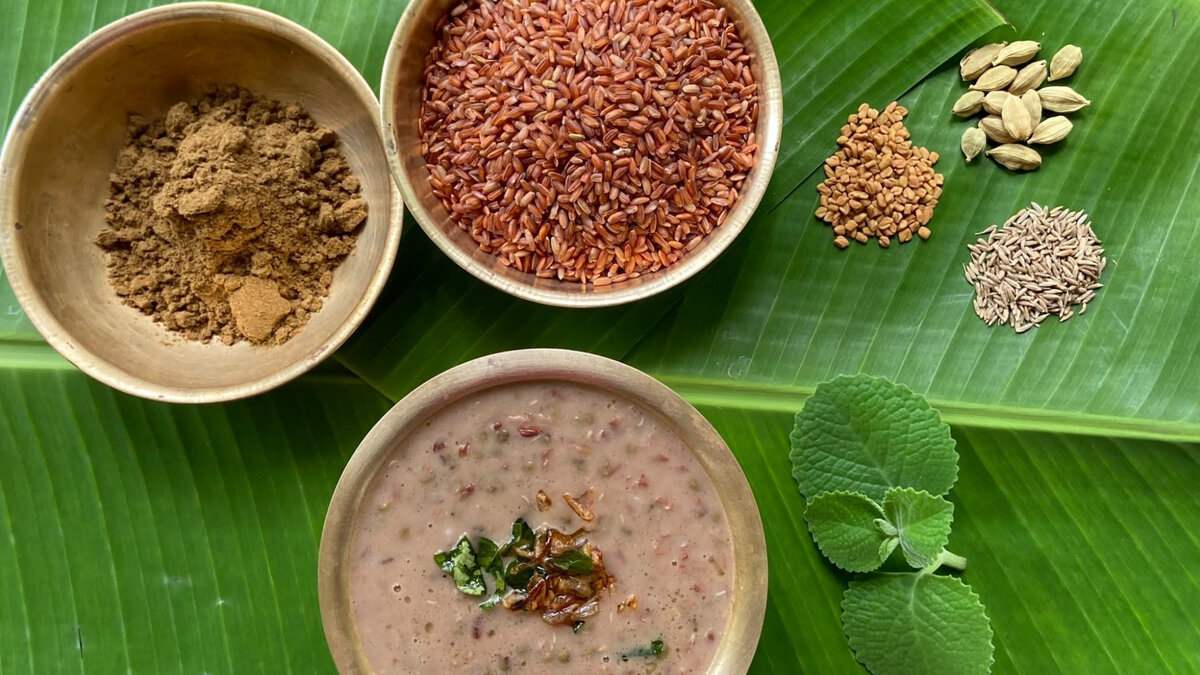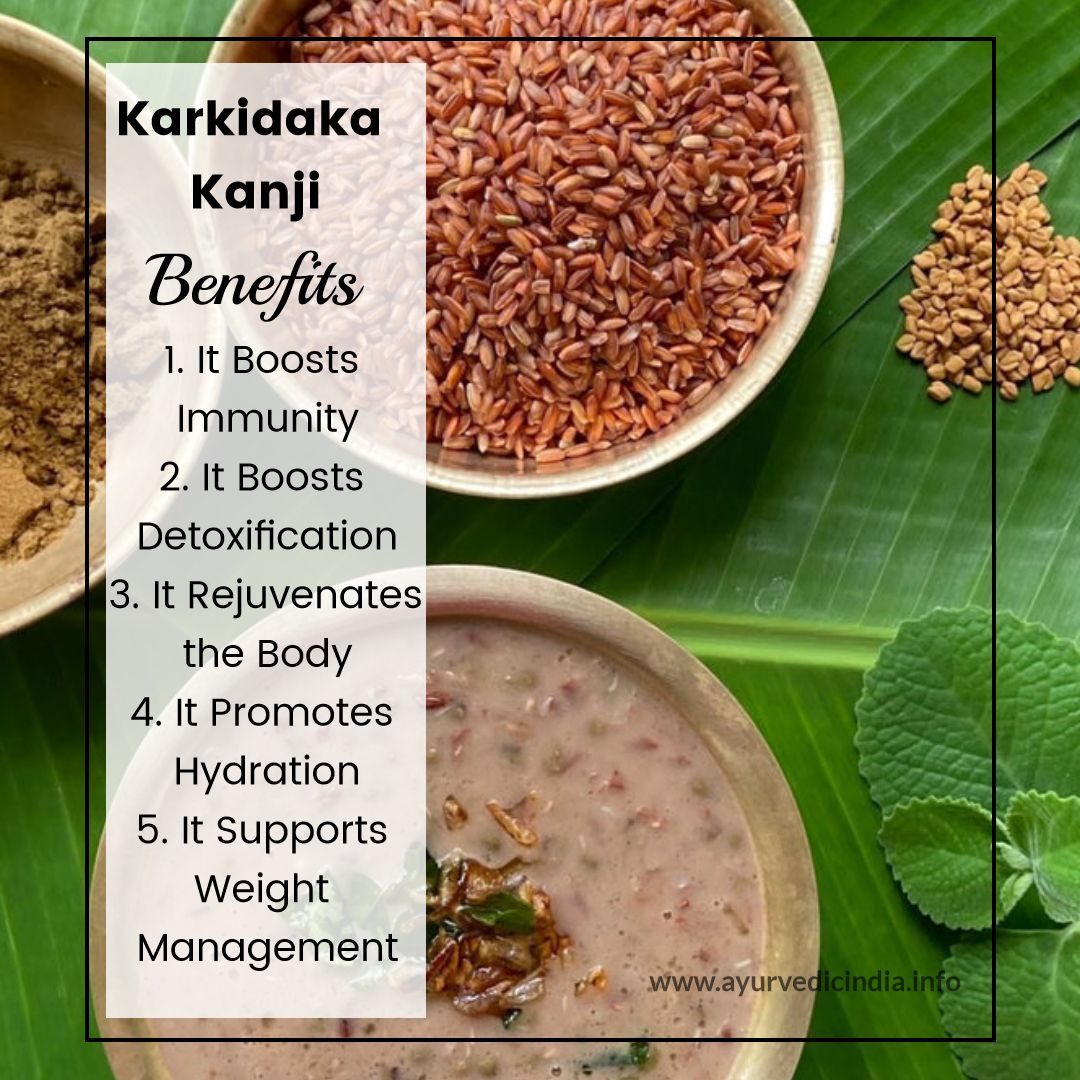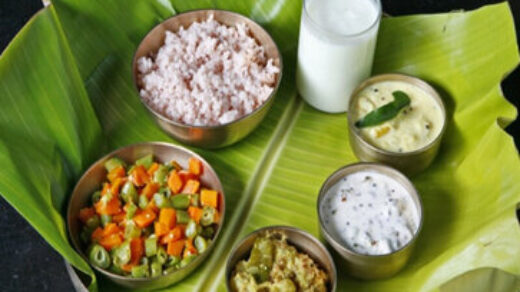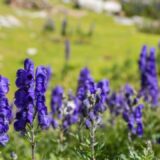Karkidaka Kanji: The Medicinal Monsoon Food of Kerala
The Karkidaka Kanji is a traditional porridge with a flexible recipe, allowing for adjustments based on individual health conditions. During the Karkidaka Masam, Ayurvedic treatments and massages are ideal, and complementing them with the Karkidaka Kanji enhances the overall experience.
Also known as Marunnu Kanji, this traditional dish lives up to its name, “Medicinal porridge” or “rice soup,” as it not only serves as a nourishing meal but is also regarded as a medicinal remedy due to its beneficial impact on the body.
The preparation method of Karkidaka Kanji varies from one household to another, as people often use medicinal plants available in their gardens to prepare the Kanji. This adaptability allows individuals to personalize the dish to their specific health needs, making it a truly customizable and healing delicacy.
The Significance of Karkidaka Kanji
Karkidakam – The Month of Ailments
Karkidakam, often referred to as “Monsoon Month,” is believed to be the time when the human body is most vulnerable to various ailments. Ayurveda, the traditional Indian system of medicine, associates this season with a decrease in immunity and an increase in the risk of diseases.
The Essence of Karkidaka Kanji
The essence of Karkidaka Kanji lies in its time-honored legacy, passed down from generation to generation in the cultural heartland of Kerala, India. This traditional medicinal gruel holds a special place in the hearts of the people, especially during the challenging monsoon period. Here’s a closer look at the essence of Karkidaka Kanji:
1. Cultural Heritage
Karkidaka Kanji is not merely a dish; it represents the cultural heritage and wisdom of Kerala’s ancestors. The preparation and consumption of this porridge carry with it the essence of centuries-old traditions and practices.
2. Time-Tested Remedy
Over the years, Karkidaka Kanji has proven to be a time-tested remedy, providing relief and healing during the monsoon season. Its effectiveness in rejuvenating the body and bolstering immunity has made it an integral part of Kerala’s traditional medicine.
3. Rejuvenating Properties
Karkidaka Kanji is celebrated for its rejuvenating properties. The carefully selected combination of medicinal herbs, spices, and nutrient-rich ingredients works in harmony to revitalize the body and replenish energy.
4. Monsoon-Specific Benefits
The significance of Karkidaka Kanji peaks during the monsoon, when the human body is more susceptible to ailments. The porridge’s unique composition aims to counteract the challenges posed by the rainy season, making it a valuable addition to the monsoon diet.
5. Immune-Boosting Elixir
One of the core aspects of Karkidaka Kanji is its ability to boost immunity. The assortment of herbs and spices used in the preparation are known for their immune-enhancing properties, providing a natural shield against infections.
6. Holistic Approach to Health
Karkidaka Kanji exemplifies the holistic approach to health prevalent in Kerala. It emphasizes the importance of nourishing the body with natural and nutritious ingredients to maintain overall well-being.
7. Symbol of Care and Tradition
As families come together to cook and share Karkidaka Kanji, it becomes a symbol of care and love. It symbolizes the sharing of ancestral knowledge and the desire to safeguard the health of loved ones.
8. Simplicity and Sophistication
The essence of Karkidaka Kanji lies in its simplicity and sophistication. The humble preparation process, combined with the wisdom of traditional healing, showcases the brilliance of simple yet effective remedies.
9. Nourishment for Body and Soul
Beyond its physical benefits, Karkidaka Kanji nourishes the soul. It evokes a sense of comfort, connection, and gratitude for the rich cultural heritage and the bounties of nature.
10. Preservation of Traditions
Through the preparation and consumption of Karkidaka Kanji, the people of Kerala preserve their ancestral traditions and pass them on to future generations, ensuring that this cherished custom lives on.
The Nutritional Value of Karkidaka Kanji
The nutritional value of Karkidaka Kanji is significant, as it offers a balanced blend of essential nutrients and medicinal properties. Here is a breakdown of the key components and their approximate percentages:
1. Carbohydrates: Karkidaka Kanji is primarily composed of carbohydrates, mainly from rice. Carbohydrates contribute to about 50-60% of the porridge’s nutritional value, providing energy for the body.
2. Proteins: The rice and coconut milk used in Karkidaka Kanji contain some proteins, contributing to approximately 8-10% of the overall nutritional content.
3. Fats: Coconut milk is a source of healthy fats, which account for about 15-20% of the nutritional value. These fats are easily digestible and provide a rich source of energy.
4. Vitamins: Karkidaka Kanji contains essential vitamins such as vitamin C, vitamin A, and various B-complex vitamins. These vitamins contribute to approximately 5-8% of the nutritional value, supporting various bodily functions.
5. Minerals: The porridge includes a blend of spices that add essential minerals like iron, calcium, potassium, and magnesium. These minerals make up around 5-10% of the nutritional content, aiding in bone health, nerve function, and more.
6. Dietary Fiber: Karkidaka Kanji contains dietary fiber from rice and herbs, accounting for approximately 5-8% of its nutritional value. Fiber aids digestion and helps maintain a healthy gut.
7. Medicinal Properties: The use of medicinal herbs and spices in Karkidaka Kanji adds unique health benefits, contributing to about 10-15% of its nutritional value. These properties include boosting immunity, aiding in detoxification, and supporting overall well-being.
Karkidaka Kanji Benefits
Karkidaka Kanji, the traditional rice porridge from Kerala, offers numerous health benefits. Here are some of the key health benefits of consuming Karkidaka Kanji:
1. Boosts Immunity: Karkidaka Kanji is rich in medicinal herbs and spices known for their immune-boosting properties. Regular consumption of this porridge helps strengthen the body’s natural defense system, making it more resilient to infections and diseases.
2. Aids Digestion: The gentle and easily digestible nature of Karkidaka Kanji makes it an ideal meal during the monsoon season when digestive problems are common. It soothes the stomach and aids in proper digestion.
3. Detoxification: This traditional delicacy acts as a natural detoxifier, helping to eliminate toxins and impurities from the body. It aids in purifying the blood and promoting overall detoxification.
4. Nutrient-Rich: Karkidaka Kanji is prepared using a combination of rice, coconut milk, and various herbs and spices. This makes it a nutritious meal packed with essential vitamins, minerals, and antioxidants that nourish the body.
5. Rejuvenates the Body: The abundance of nutrients in Karkidaka Kanji provides a revitalizing effect on the body. It helps replenish energy levels and revitalizes the body, especially during the monsoon season when fatigue is common.
6. Promotes Hydration: The high water content in Karkidaka Kanji helps keep the body hydrated, especially during the hot and humid monsoon weather.
7. Supports Weight Management: Karkidaka Kanji is a filling and satisfying dish that can aid in weight management. It provides essential nutrients while keeping the calorie intake in check.
8. Cleanses the Respiratory System: The aromatic spices used in Karkidaka Kanji have respiratory benefits. They can help clear congestion, ease breathing, and provide relief from respiratory issues aggravated during the monsoon season.
9. Reduces Inflammation: Some of the herbs and spices in Karkidaka Kanji have anti-inflammatory properties, which can help reduce inflammation and alleviate discomfort caused by inflammatory conditions.
10. Stress Relief: The comforting and nourishing nature of Karkidaka Kanji can have a calming effect on the mind, offering stress relief and promoting relaxation.
11. Improves Gut Health: The probiotics present in fermented versions of Karkidaka Kanji can improve gut health by promoting the growth of beneficial gut bacteria.
12. Balances Doshas: According to Ayurveda, Karkidaka Kanji helps balance the doshas, particularly Vata and Pitta, which tend to get imbalanced during the monsoon season.
Overall, Karkidaka Kanji is more than just a delicious dish; it is a medicinal preparation that provides a host of health benefits, making it an essential part of Kerala’s traditional monsoon cuisine.
Preparing Karkidaka Kanji
Karkidaka Kanji is a traditional medicinal gruel with no strict recipe, but certain beneficial ingredients are recommended to enhance its health benefits. Based on Ayurvedic texts, the following ingredients are commonly used in karkidaka kanji recipe:
karkidaka kanji ingredients:
- 1 cup of Njavara or Kerala red rice
- 200 ml of coconut milk (divided into thick and thinner portions)
- 5 grams of ginger powder or crushed ginger
- A pinch of turmeric powder
- 1 teaspoon of crushed garlic
- 1 teaspoon of Jeera (cumin seeds)
- 1 teaspoon of crushed pepper (not powdered)
- 1 teaspoon of carom seeds
- Jaggery (as per taste)
- 5 teaspoons of fenugreek seeds
- 2-3 teaspoons of ghee
Method:
1. Boil the rice while simultaneously grinding all the dry ingredients (except for jaggery).
2. Add the ground mixture to the boiling rice and let it cook.
3. Add jaggery to the boiling mixture and let it thicken.
4. Once it starts to thicken, add the thin coconut milk, and after a minute or two, add the thick coconut milk. Turn off the flame.
5. Add ghee on top and serve as preferred.
If using a pressure cooker, add the ground mixture from the beginning. The rest of the procedure remains the same as mentioned above.
The Karkidaka Kanji recipe can be adjusted to suit individual needs and health conditions. Combining this nourishing dish with Karkidaka Chikitsa can provide the body with optimal health benefits.
(Note: The recipe provided is for informational purposes only. Please consult a qualified Ayurvedic practitioner before making any changes to your diet or health routine.)
The Cultural Connection
Tradition and Heritage: Karkidaka Kanji is deeply rooted in Kerala’s culture and traditions. It reflects the wisdom of the ancestors and the art of utilizing nature’s resources for well-being.
A Taste of Nostalgia: For the people of Kerala, Karkidaka Kanji is not just a remedy; it is a nostalgic reminder of their childhood and ancestral practices.
FAQs for Karkidaka Kanji
1. Is Karkidaka Kanji suitable for all ages?
Yes, Karkidaka Kanji is a wholesome dish suitable for people of all ages, from children to the elderly.
2. Can Karkidaka Kanji be consumed daily?
Yes, it can be consumed daily during the monsoon season to reap its full benefits.
3. Does Karkidaka Kanji have any side effects?
Karkidaka Kanji is a natural and safe preparation with no known side effects when consumed in moderation.
4. Can Karkidaka Kanji be frozen for later consumption?
While it is best enjoyed fresh, Karkidaka Kanji can be frozen and reheated when needed.
5. Is Karkidaka Kanji vegan-friendly?
Yes, the traditional recipe of Karkidaka Kanji is entirely plant-based and vegan-friendly.
Karkidaka Kanji stands as a beacon of Kerala’s cultural heritage and its traditional approach to health and well-being. This humble rice porridge, with its healing properties and nutritional benefits, continues to nourish both body and soul during the monsoon season.
References:
- A STUDY ON MEDICINAL PLANTS USED IN KARKIDAKA KANJI: A HEALTH TRADITION OF KERALA (1)
- A_STUDY_ON_MEDICINAL_PLANTS_USED_IN_KARKIDAKA_KANJI_A_HEALTH_TRADITION_OF_KERALA(2)
- SCIENTIFIC EVALUATION OF SEASONAL DIETARY PRACTICES IN KERALA – KARKITAKA KANJI, MUKKUDI, PATTILA CURRY (3)

























